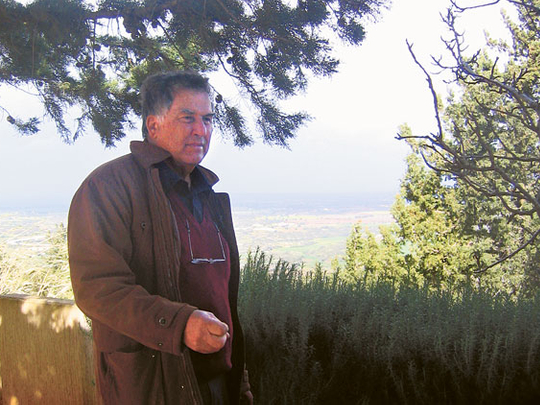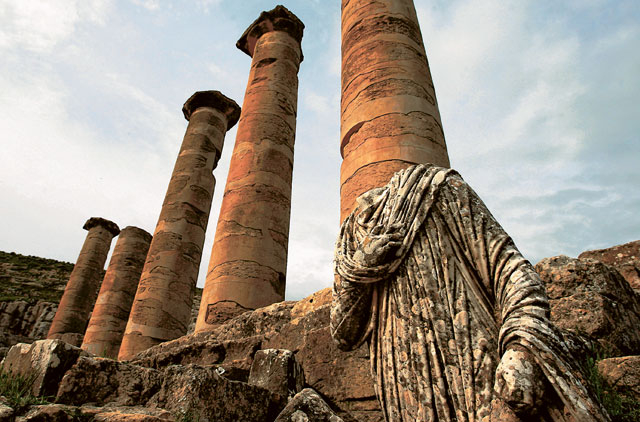
The white pickup truck came screeching around a corner, its burly, armed occupant more like a rebel fighter, AK-47 pointed at the group who had entered this valley.
"It's OK," the doctor says. "He's one of my students."
The bearded fighter lowers his weapon and talks of wanting to excavate a new tomb the fighting students have just found.
His teacher smiles enthusiastically but says not now, later, when the fighting is done across Libya.
Dr Fadil Ali Mohammad is a professor of archaeology but to all the fighters and men under his control, he is simply known as "the doctor".
"I organised my students to protect these ruins," he says, as he surveys the valley floor below. There, ancient columns reach skyward and deserted streets unite a city of carved blocks. This land, where civilisation thrived and democracy flourished, is now riven by modern conflict.
In the valley sides, honeycombed by 1,500 Greek tombs, many more treasures are waiting to be unearthed by the doctor's students, when they will again replace sub-machineguns and bullets with spades and brushes.
As he talks, another young man — also a student — stands sentinel over this ancient treasure, a Belgian-made automatic rifle clutched tightly in his arms, a dirty military blanket over his shoulders.
Founded in 631BC, Cyrene is a city which the Greek, Roman, Byzantine and Islamic civilisations called home.
It is also a place that has been largely forgotten by scholars outside Libya.
"These ruins are better preserved than the Acropolis in Athens," the doctor says.
This ancient city is about 20 kilometres to the east of the modern city of Al Baydeh in eastern Libya, high on a fertile plateau in the Green Mountains overlooking the Mediterranean.
For close to 20 years, the doctor lived and lectured in Athens, unable to return home to these ruins where he has dedicated so much. As a student, he ran afoul of the Gaddafi regime, spending two years in a small, square concrete cell, a small window his only link to the outside world.
"Under Gaddafi, there was no talk of archaeology or preserving the past," the doctor says. "He is not an educated man in terms of history or literature. He is a graduate of military school. We scholars, who sought to preserve Libya's history, we were threats. Our studies were dangerous in Gaddafi's Libya. He was not interested in the past. He did not understand us."
And the very real fear was that Gaddafi, as erratic as he proved to be, would one day use the ancient ruins as target practice for his tanks and artillery.
"We had to put plans in place to ensure that this world treasure — it is not just a jewel of Libya but of the entire ancient world — it had to be protected at all costs," the doctor says. "When we saw what the Taliban did to those ancient statues of the Buddha built into cliffs in the 14th century, we began to realise there was a danger of Gaddafi doing the same here."
Thousands of artefacts were removed and taken away to a secure storage area. There they were catalogued and studied — not in the sense of a museum but as a measure of protection for an irreplaceable piece of heritage threatened by a megalomaniac's ego.
Should this ancient jewel ever be visited by tourists and scholars, the doctor hopes that a proper museum and display centre can be built.
It was to this lush, fertile land discovered by immigrants from present-day Santorini that the ancient Greeks came, guided by local Libyan tribesman.
Archaeological studies show that this place had been populated by nomadic people long before the Greeks came. In 1957, a jaw of a Neanderthal was discovered, indicating that this area has had human habitation for at least 80,000 years. Poor rain and overpopulation on Santorini led the Greeks with Battus at their fore to Cyrene. The ancient oracle at Delphi had also told them of the need to seek the city in the land of the Green Mountains.
Today Cyrene's temples, theatres and public spaces point to a city that prospered in the fertile lands, where wheat was abundant and other crops grew with ease.
"An ancient carving from 330BC reveals that during a time of shortage in Athens, this area was able to send the equivalent of 400,000 kilograms of wheat, fending off a food crisis there," the doctor says.
Cyrene became an independent republican state in 440BC, a time when its citizens had more democratic power and access to justice than present-day Libyan citizens.
"Now that we are standing against Gaddafi, maybe we can get back some of the rights enjoyed by people here 2,500 years ago," the doctor says.
His four eldest children, all sons, were born in exile in Greece.
"They are all Libyans, though," the doctor says. His second son was injured in the battle for Al Baydeh.
"He was fighting to take the military compound. One of his friends was hit, so he rushed to save him. While he was carrying his friend back to safety, he was shot in the hand. He's OK, though," the doctor says proudly.
The reality, however, is that because of lack of proper medical equipment, his son has developed a nasty infection and is in danger of losing part of his arm to amputation if doctors fail to halt the spread of the infection.
Another of his sons has vowed not to shave until Gaddafi is gone. "I hope it is sooner rather than later — my son is beginning to look like a Taliban fighter now," the doctor jokes.
With his understanding of ancient military history and a fascination for battles that raged in the area between German Field Marshall Erwin Rommel's Afrika Corps and Bernard Montgomery's 8th Army in 1942, the doctor put a plan in place to seize weapons and material for modern-day warfare when the time was right — either to protect the ruins or to fight for Al Baydeh.
And it was against the Gaddafi regime and his mercenaries that the plan was put in place, his sons and students forming the vanguard of the insurgents.
Because of the area's natural beauty and archaeological significance, the Gaddafi family established a summer villa and family compound high in the hills of the Green Mountains. The dictator did not trust his own people to build the complex. A German company using Turkish labourers constructed the villas and a huge bomb-proof bunker network.
"For anyone entering the area without permission it meant death," the doctor says.
But Saif Gaddafi was unlike his father in many ways — he was educated, with a doctorate from the London School of Economics. For him, these nearby ruins of Cyrene were to be cherished, a place which showed the glory of ancient Libya, a national treasure where arts and culture thrived.
"He summoned me to the summer compound," the doctor says. "We met in a sunhouse for about two hours and had tea. We discussed the ruins, how to preserve them and what needed to be done. He is an educated man and seemed to have a genuine interest in preserving Cyrene," the doctor recalls. "But at the same time, I knew I was in a place where few Libyans had been, the regime run by his family had jailed and exiled me, and around me were women sunbathing and partying. It was a dangerous place for me to be. I had to listen and talk without saying anything."
According to the doctor, history needs to be studied so that it is not repeated.
"We must study the past to prepare the future," the doctor says.
"These stones and ruins have seen people come and go, tyrants come and go. These stones stand as a reminder that civilisations are fragile, that they are not permanent. They come and go because of people and of leadership. This place has seen the Greeks and the Romans. There have been vast empires here, where man thought he was supreme. Yet where are those people now? All that is left are their ruined buildings, their statues, their amphitheatres and their temples. This place has also seen the end of Gaddafi. His revolution has lasted 42 years. That is nothing when you look at these columns and how they have withstood the ravages of time."
Cyreneans were renowned for their horses and skills with chariots. Records even indicate that they participated in the ancient Olympics in Athens.
After Alexander the Great's conquest of Egypt, he visited Siwa Oasis in western Egypt. It was here that he met a welcome party of 300 or so horsemen from Cyrene.
Under two centuries of Ptolemaic rule, the area endured disquiet before the last Egyptian pharaoh, Ptolemy Apion, bequeathed the area to the Romans in 96BC. It was united with Crete after Antony's defeat at the Battle of Actium in 31BC.
Much of Cyrene was destroyed by an earthquake in 395. Although the city was rebuilt, it never again reached the scale of its glory.
"Cyrene has been a secret to much of the world these past four decades," the doctor says. "Few know of its existence but the few Western visitors who have come here have been overwhelmed by its beauty here in the Green Mountains, overlooking the ancient port of Apollonia."
Overlooking this secret valley stands a villa, once the summer home which former Italian dictator Benito Mussolini visited regularly.
"I showed Robert de Niro and Merryl Streep Cyrene when they were here in 2005," he says.
"De Niro just wanted to sit here among the ruins. He told me that he felt as if he was on a film set without any other actors or directors. He just sat for a long time and took in its beauty."
Another GCC leader came to Cyrene and wanted to invest here, believing it would prosper with proper exposure and hotels.
"That is still our wish," the doctor says. "That is not possible under Gaddafi. Now that he is on his way out, Cyrene may get the kind of attention and infrastructure needed to preserve it for future generations and to show it off to the world as a ancient wonder."
Even as he speaks, the student with the blanket and the Belgian rifle stands guard, always watching over the ruins.
"We must protect Cyrene for the future," the doctor says. "And for now too."



